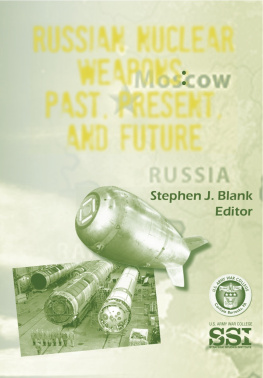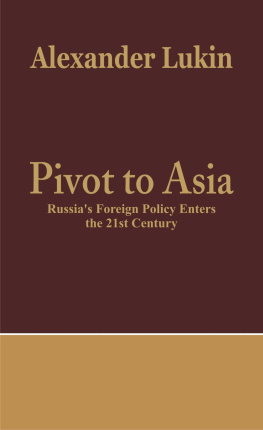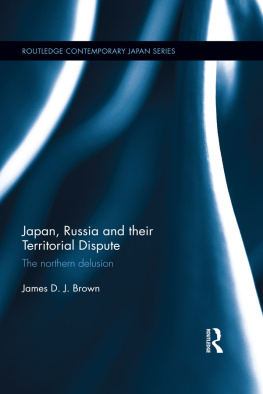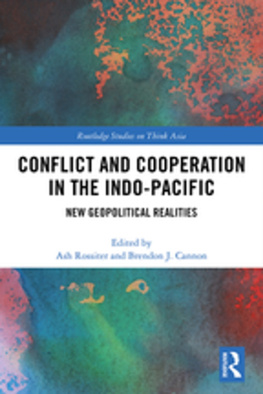SSI Monograph
RUSSIAS PROSPECTS IN ASIA
Stephen J. Blank
Editor
December 2010
The views expressed in this report are those of the authors and do not necessarily reflect the official policy or position of the Department of the Army, the Department of Defense, or the U.S. Government. Authors of Strategic Studies Institute (SSI) publications enjoy full academic freedom, provided they do not disclose classified information, jeopardize operations security, or misrepresent official U.S. policy. Such academic freedom empowers them to offer new and sometimes controversial perspectives in the interest of furthering debate on key issues. This report is cleared for public release; distribution is unlimited.
*****
This publication is subject to Title 17, United States Code, Sections 101 and 105. It is in the public domain and may not be copyrighted.
*****
Comments pertaining to this report are invited and should be forwarded to: Director, Strategic Studies Institute, U.S. Army War College, 122 Forbes Ave., Carlisle, PA 17013-5244.
*****
All Strategic Studies Institute (SSI) publications may be downloaded free of charge from the SSI website. Hard copies of this report may also be obtained free of charge by placing an order on the SSI website. The SSI website address is: www.StrategicStudiesInstitute.army.mil .
*****
The Strategic Studies Institute publishes a monthly e-mail newsletter to update the national security community on the research of our analysts, recent and forthcoming publications, and upcoming conferences sponsored by the Institute. Each newsletter also provides a strategic commentary by one of our research analysts. If you are interested in receiving this newsletter, please subscribe on the SSI website at www.StrategicStudiesInstitute.army.mil / newsletter/.
ISBN 1-58487-469-4
CONTENTS
Foreword .........................................................................v
Introduction ...................................................................vii
Chapter 1. Russias Posture in and Policy Towards
Northeast Asia
Viacheslav B. Amirov ...............................1
Chapter 2. Russia in East Asia: Aspirations and
Limitations
R. Craig Nation ......................................29
Chapter 3. Russian Repositioning in Northeast
Asia: Putins Impact and Current
Prospects
Gilbert Rozman .......................................63
About the Contributors ...............................................97
FOREWORD
The papers collected here represent the Strategic Studies Institutes (SSI) continuing efforts to foster dialogue on topical issues in international security among experts from the United States and abroad. These papers are taken from the conference that SSI conducted on January 25-26, 2010, entitled, Contemporary Issues in International Security, at the Finnish embassy in Washington, DC. This was the second conference that SSI organized, bringing together U.S., Russian, and European experts to discuss important questions in contemporary world affairs. We hope to continue these conferences on an annual basis because of the importance of such dialogue among experts and governments. But rather than publishing as a book, which we did in 2009, SSI has decided to publish them on a panel-by-panel basis. This particular collection is devoted to the question of Russias prospects in Asia, a question that is all too often overlooked in U.S. analyses of either Russia or Asia.
Accordingly, we hope to help remedy that blindspot in U.S. analyses (a blindspot not found in analogous Russian analysis) by bringing the views of eminent Russian and U.S. analysts to our readers attention. We hope that the succeeding collections of papers on topics of equal importance will similarly contribute to improved mutual understanding and ongoing dialogue regarding the great questions of world affairs.

DOUGLAS C. LOVELACE, JR.
Director
Strategic Studies Institute
INTRODUCTION
On January 25-26, 2010, the Strategic Studies Institute ( SSI) conducted a conference entitled, Contemporary Issues in International Security, at the Finnish embassy in Washington, DC. This was the second in what we hope will be annual conferences bringing together U.S., European, and Russian scholars and experts to discuss such issues in an open forum. The importance of such regular dialogues among experts is well known, and the benefits of these discussions are considerable. Just as we published the papers of the 2008 conference in 2009 (Stephen J. Blank, ed., Prospects for US-Russian Security Cooperation , Carlisle, PA: Strategic Studies Institute, U.S. Army War College, 2009), we are doing so again. However, in this case, we are publishing the papers on a panel-by-panel basis.
The panel presented here was devoted to an unjustly neglected topic, Russias standing and prospects in East Asia. While U.S. policymakers openly discuss the possibilities for partnership with Russia in Europe and Central Asia, they often do not even bother to mention Russia as a player in East Asia, an omission that no Russian statesman has ever made, and with good reason. Indeed, for the last decade, Russia has consistently striven to upgrade its profile and capabilities in Asia. The papers set forth here depict three differing analyses of the extent to which Russia has succeeded or failed in this endeavor, including the nature of the complex East Asian environment in which Russia must operate. They make a strong case against such neglect of Russia as an Asian player, either in the analytical or policymaking process. These papers
present differing U.S. and Russian assessments of Russias Asian prospects for our readers benefit. They will, so to speak, serve to kick off the ensuing publication of the papers from the other panels which dealt with issues of equal, if not even greater, consequence in contemporary security.
Stephen J. Blank
Editor
CHAPTER 1
RUSSIAS POSTURE IN AND POLICY
TOWARDS NORTHEAST ASIA
Viacheslav B. Amirov
INTRODUCTION
Northeast Asia (NEA) is a place where economic interdependence among the NEA troikaChina, Japan and South Koreais growing. Moreover , intense interaction within that troika will determine the extent of further economic (and political) integration in the much wider regionPacific Asia (which stretches from areas of Pacific Russia in the north to New Zealand in the south).
This is a very important fact for Russia, though an understanding of its significance for the country has come only very recently. The long-standing issue for Russia is the future of the Russian Far East (Pacific Russia or RFE), its social and economic development, and its security. Pacific Russias future depends to a great extent on its involvement in the NEA regional economy.
Yet Russia continues to maintain a low profile in NEA, despite new efforts made by the Russian government to move the center of gravity of the countrys economy eastward, towards its vast, uninhabited territory with its huge potential resources. But the NEA still remains a rather small blip on the Russian foreign policy radar. For example, in the list of priorities announced by Russian Foreign Minister Sergei Lavrov, in his 2009 interview regarding the countrys foreign policy agenda, one finds the so-called reset in the relations with the United States, European security, the importance of the Commonwealth of Independent States (CIS), etc. As usual, NEA and Russias national interests in the Far East received short shrift. China was mentioned, viz., the importance of developing multi-dimension relations with China and our other partners in BRIC [Brazil, Russia, India, and China]. Granted, relations with China have great importance for Russia, but BRIC remains a phantom entity with quite an unclear future.








